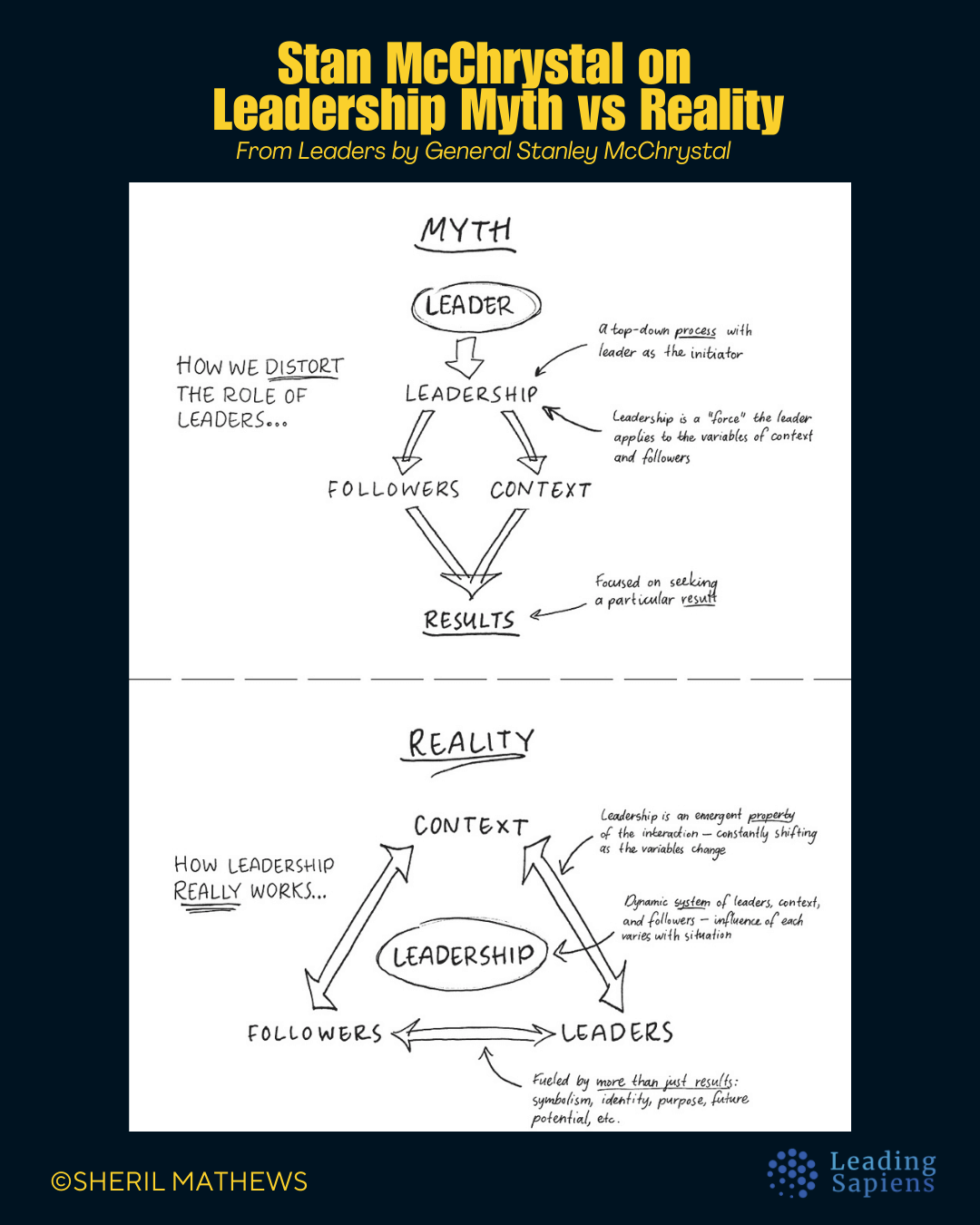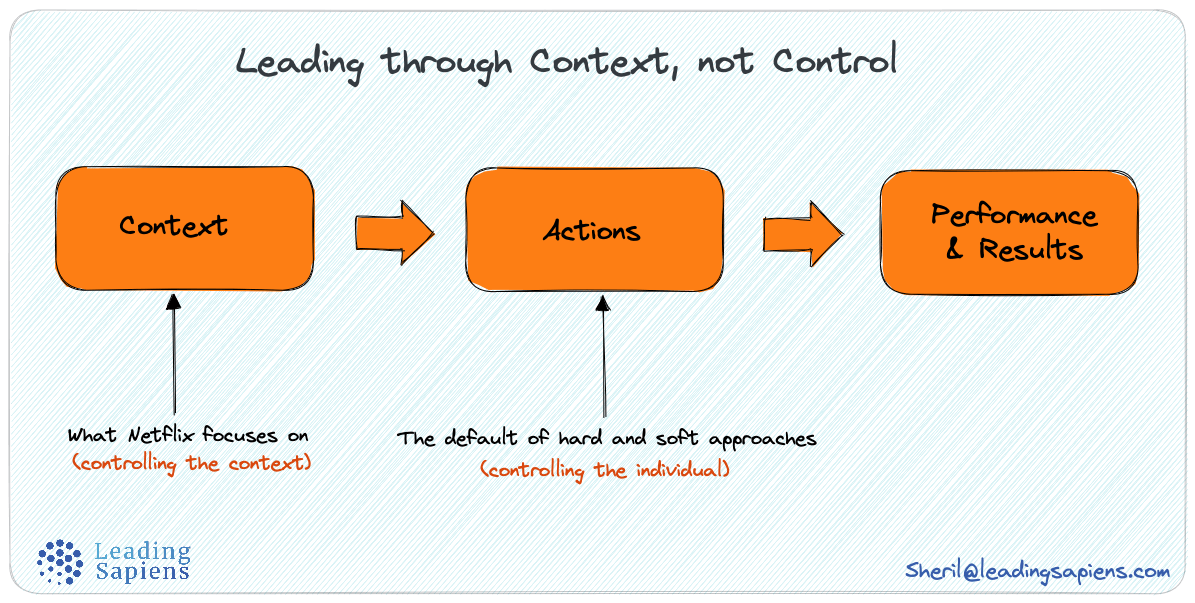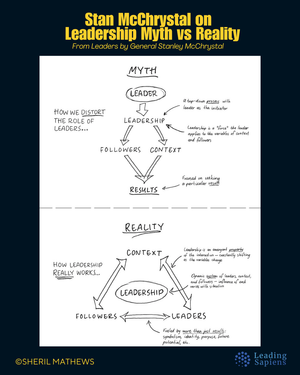General Stanley McChrystal commanded forces in one of the most results-driven environments imaginable — yet his deepest insight about leadership has nothing to do with outcomes. If someone whose career depended on winning wars discovered that results aren't what leadership is about, what does that say about how the rest of us think about it?
McChrystal studied leaders across vastly different contexts, from corporate executives to military commanders to social reformers. What he found challenges the fundamental assumptions most of us carry about what leadership actually is.
In Leaders: Myth and Reality [1] he writes,
If we were to circumscribe these [myths] with a more accurate definition, we might say that leadership is a complex system of relationships between leaders and followers, in a particular context, that provides meaning to its members.
This is a radical departure from how we typically think about leadership. Notice what's missing from this definition: There's no mention of traits, techniques, or results. Instead, he focuses on relationships, context, and meaning. Leadership becomes less about what leaders do and more about what they create — a web of relationships that helps people make sense of their world.
For a general who spent decades in command positions where lives hung on tactical decisions, this insight is particularly striking. McChrystal didn't arrive at this definition through academic theory. He discovered it by studying what actually worked across the most demanding leadership challenges imaginable.
His reframe illuminates why the five leadership myths are both seductive and dangerous. He explains:
Sometimes that meaning may take the form of driving and achieving results. Other times it will take the form of achieving some sense of understanding, or hope, or identity. But we miss part of what makes leadership powerful if we confine it to just one aspect or the other.
This reframed definition provides fresh perspective on our three myths.
First, it speaks to the Results Myth, and begins to explain why we’re so willing to define leadership as the pursuit of specific outcomes, and still look up to leaders who have failed us. Human systems are oddly capable of selecting or tolerating immoral and incompetent leaders because they provide a different kind of meaning elsewhere, such as social identity or ideological affiliation. Leadership, like humanity, is often ends-focused and path-dependent. Rarely do we stop to consider why we follow our leaders, and whether we do so for the sense of purpose they provide or the results they can offer. In some situations we think we need a symbol, and in others, a doer. In reality, and despite the preponderance of the Results Myth, neither alone can suffice, at least not for long.
Second, it speaks to the Attribution Myth, and portrays leadership as a network of relationships, while allowing for the fact that leaders still matter greatly within this web. Also, it shifts from the one-directional process of causality to leadership being a property of a system, subject to the vast array of influences that push it around.
Third, it speaks to the Formulaic Myth, and explains quite directly that leadership cannot be made prescriptive, precisely because effective leadership makes sense only in a given context, which is always changing. Not only is there no “right answer,” but effective leadership often emerges as a juxtaposition of two behaviors that seem contradictory, thus necessarily it can’t be distilled to the “right” kind of leadership. For instance, this helps resolve the puzzle whereby humble and vulnerable leaders can be just as effective as leaders who present as strong and confident, because we’re more open to the idea that both sides of this apparent paradox are true.
Finally, this view of leadership also speaks to what makes leadership both so universally necessary and also so confounding. Leaders are necessary because we tend to understand the world through individuals who organize into various structures as a way of fulfilling collective needs. This is particularly important in our current digital age, for there will still be a unique niche for human learning and organic intelligence, and it is in this enduring sphere that leadership will remain prized.
In sum, this view of leadership expands rather than diminishes leadership; it is something that helps us to make sense of the world, sustains our common identities, and holds hope for a brighter tomorrow. Like leadership itself, our need for such symbols—meaning, identity, hope—is part and parcel of our human nature, which few ever saw as being so simple. Coming to terms with our own complex selves allows us to recognize that leadership too is necessarily difficult and yet endlessly inspiring.

The implications go deeper than changing how we evaluate leaders. They challenge how we think about our own development.
If leadership is a property of relationships and context, then the question isn't "Am I leadership material?" but "What relationships am I cultivating, and what meaning am I helping create?"
- The executive who spends hours perfecting strategy presentations might ask: What conversations am I avoiding that would build the relationships necessary for actual change?
- The manager frustrated by team performance might ask: What context am I creating through my daily interactions, and is it the context that brings out people's best work?
- The individual contributor waiting for a formal leadership role might ask: Where can I create meaning and strengthen relationships right now, regardless of title?
McChrystal's insight reveals that leadership development isn't about accumulating traits or mastering techniques. Instead, it's learning to read the complex interplay of relationships and context around you — and then having the courage to act in service of something larger than yourself, even when you can't control the outcome.
The mythic leader is a fantasy. Leadership as an emergent property of healthy systems is both more realistic and more powerful.
Related Reading



Sources
- Leaders: Myth and Reality by General Stanley McChrystal, Jeff Eggers, Jay Mangone.





